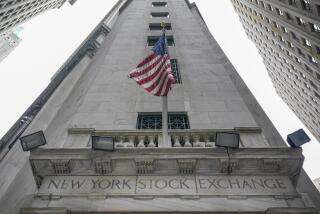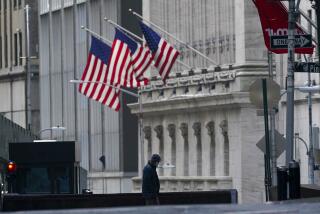Russian Bank Crisis Feared as Depositors Demand Money
MOSCOW — Growing unease gripped the Russian banking and investment sectors Wednesday as the government moved to execute a $3.4-billion tax judgment against Yukos Oil Co., and two of the nation’s largest private banks faced demands for withdrawals from nervous customers.
Though officials continued to insist that the economy was strong, there were fears of a full-fledged banking crisis as Alfa Bank, one of the nation’s five biggest banks, closed many of its automatic teller machines and offered some depositors appointments on Saturday to avoid waiting hours in line for withdrawals.
Guta Bank shut down its network of 76 branches Tuesday, announcing that it was unable to pay on deposits because of a higher-than-normal outflow of funds in June and July. The move sent shockwaves through the financial community. The government stepped in Wednesday with a plan to buy out the $1.2-billion bank.
Analysts said the economic woes probably were an outgrowth of recent banking reforms that have attempted to crack down on marginal institutions and money laundering -- ultimately, a healthy signal to the industry.
“There is no crisis,” Central Bank Chairman Sergei Ignatiev told members of parliament. He said that though the demand for withdrawals exceeds the easily available cash, the Central Bank is ready to cover the shortfall.
But coupled with the showdown over Yukos -- in which paramilitary police showed up with bailiffs Wednesday to seize the contents of some company safes -- the bank problem underscored a growing financial unease in a nation that is otherwise flush with oil money and has one of Europe’s best-performing economies.
Yukos shares, which had plunged 11% on Monday with word of a $1-billion Yukos loan default, rose as much as 23% during the day Wednesday and and closed with a 13.14% gain. The trading bonanza was fueled by news that major shareholder Mikhail Khodorkovsky was ready to avert a Yukos bankruptcy by selling his 36% stake to pay the company’s total estimated $7 billion in tax debts.
The growing crisis at the banks had no direct relation to the Yukos case, but analysts said anxiety over the oil giant’s troubles undoubtedly contributed to unease among depositors and volatility in interest rates for loans between banks, which worsened the situation.
Dozens of clients gathered outside Guta Bank offices. At Alfa Bank, officials said that any cash shortages were temporary and that the bank had $3 billion in reserves.
“We do not think what is happening is a crisis,” said Natalya Dokuchayeva, deputy head of Alfa Bank’s press service. “It really amounts to a bank run -- people come and withdraw all their deposits. Naturally, it amounts to large sums of money.... But Alfa Bank has got enough cash to cover all money deposits.”
At one Alfa Bank branch in central Moscow, some depositors who had come to withdraw from their accounts were leaving empty-handed.
“Being a pussyfoot, I decided to draw out my money ... but it didn’t work, because the ATMs are not working now,” said Yuriskin Andrey, head of the financial department at Agro Holding. “I made an appointment with the bank on Saturday, and they promised to return my money then.”
Alexander Krapinsky, a 30-year-old doctor, also was given an appointment for Saturday.
“This is the last time my family will keep money in Russian banks,” he said. “I spoke with my patients who work in the banking system, and they advised me to take my money out today. They told me that it might be too late to do it tomorrow.”
Alfa’s customers have withdrawn $100 million in deposits since Saturday, Alfa Vice President Alexander Gafin told reporters.
Analysts said the problem started when the government made good on its pledge to crack down on the large number of fringe banks that for years have been used for various financial subterfuges. The threat became concrete recently when the Central Bank withdrew the license of Sodbusinessbank, accusing it of numerous regulatory violations and money laundering.
Rumors that other banks were on a “blacklist” caused interbank market rates -- the interest rate at which banks loan each other money -- to rise precipitously. That drove some small banks toward insolvency, and the headlines from those troubles sent depositors rushing toward the tills.
The escalating situation hit the major firms Tuesday when Guta, Russia’s 19th-largest retail bank, locked out depositors and sought a bailout from the larger, state-owned Vneshtorgbank.
Analysts said they believed that Alfa Bank was healthy but temporarily beset by panicked depositors.
“The public in Moscow has been burned a number of times by banking problems, and they’ve begun to take money out of all the banks that they can,” said Richard Hainsworth, head of RusRating, a Moscow-based bank rating agency.
“There is no reason for this banking crisis,” he added. “The whole situation is changing in the Russian banking system, and that’s beneficial to Russian depositors.”
Yet small banks with limited resources may be unable to withstand the current crunch, said Steven Dashevsky of the Moscow-based Aton Capital Group.
“If the shareholders of such a huge bank as Alfa Bank possess extra resources to withstand this bank run wave, many small banks who are deprived of such resources will have to close down,” he said. “In that sense, we can be sure we have not seen the end of this story yet.”
Meanwhile, midnight Wednesday was the deadline for Yukos to come up with the $3.4-billion tax levy, and company spokesman Hugo Erikssen said the government had refused Yukos’ offers to negotiate.
In what could be an important move toward a resolution, Khodorkovsky’s lawyer, Anton Drel, announced that his client proposed using a package of Yukos shares belonging to large shareholders in the company to settle the tax claim.
Khodorkovsky and his partners at the holding company Group Menatep own 60.5% of the stock in Yukos. Khodorkovsky has been in prison since October, facing fraud and tax evasion charges.
It was not clear whether other key shareholders would approve the plan, or who would acquire the stock and at what price. Handing it over to the government or selling it to a government-owned company such as energy giant Gazprom, one scenario, would amount to renationalizing one of Russia’s biggest companies.
“What is happening to Yukos is a barbaric and merciless redivision of power -- it is state terror, pure and simple,” former Economics Minister Yevgeny G. Yasin said.
Alexei V. Kuznetsov and Yakov Ryzhak of The Times’ Moscow Bureau contributed to this report.
More to Read
Sign up for Essential California
The most important California stories and recommendations in your inbox every morning.
You may occasionally receive promotional content from the Los Angeles Times.










